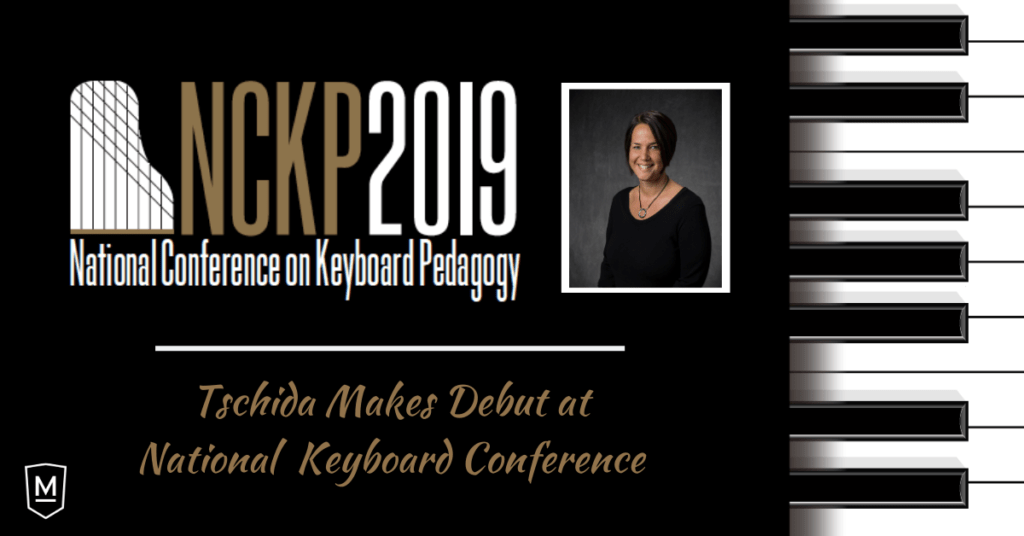Tschida Makes Debut at National Keyboard Conference
Every two years, pianists from around the world convene in Lombard, Illinois, for the much-anticipated National Conference on Keyboard Pedagogy. This year marked the 20th anniversary of NCKP and the 40th anniversary of its forerunner, the National Conference on Piano Pedagogy. The conference saw a record attendance of over 800 as educators and musicians all around the United States, and the world, gathered for an intense four-day program of workshops, publisher showcases, concerts, and lightning talks.
Janet Tschida has attended the NCKP for several years, and this year she submitted several session proposals to the conference committee. Her proposals were accepted, and she received the honor of presenting six times during both the Pre-Conference and the Conference. Drawing from her experience working with students at Maranatha Baptist University and Maranatha Music Prep School, as well as from her own professional research, Tschida presented workshops on four topics that have transformed her own teaching and that of the pedagogy interns.
In “Elementary Level Chording for Sing-Alongs and Accompanying,” Tschida discussed simple, practical ways to create chording arrangements for elementary level students. Through a variety of examples, she showed that even beginners can create impressive-sounding arrangements, accompany other instrumentalists, and play for sing-alongs. Beginners can also experience the joy of playing with others, as Tschida showcased in “Pian-Orff – Piano Ensembles for Beginners.” Based on select principles from the Orff Methodology, she demonstrated how to create fun ensembles that develop students’ independence, interdependence, and creativity.
“Do you have students who can count aloud and even write in the counts, but seemingly have no internal sense of rhythm?” Tschida asked in the session description for “Rhythmic Revolution.” This workshop introduced an innovative sound-before-sight approach that develops aural skills and incorporates whole-body activities, promising an effective and engaging learning experience.
In “The Successful Group Lesson: Working with Beginners,” Tschida and other panelists from the NCKP Committee on Music in Early Childhood discussed the theory and practice of teaching group lessons to beginners. They specifically addressed musicianship, creativity, improvisation, musical play, and adapting group activities to private lessons.
“To prepare sessions for a conference at this level involves an incredible amount of time studying and practicing,” Tschida reflects. “During my preparing and rehearsing this summer, my understanding of the content was constantly being deepened and clarified. I realized just how much I enjoy doing this sort of work and hope to do more with curriculum and resource development in the future.”
Tschida’s research and time commitment paid off in each of her sessions: “In both Rhythmic Revolution and Pian-Orff, my goal was to give the attendees an experience followed by an explanation – a format that was very well-received by all in attendance. In Elementary Level Chording, each step was experienced and then explained due to the content. The panel presentation was a new experience, and I loved being able to collaborate with amazing people such as Elaina Burns, Linda Fields, Marilyn Lowe, Janna Olson, Arlene Steffen, and Jodi Stewart-Moore.” After the conference, Tschida received numerous emails of gratitude for the content she presented, and many colleagues requested additional info and materials for use in their own teaching.
For Tschida, one of the highlights of NCKP was learning from other music professionals in between her sessions. “I never cease to be amazed by the genius and creativity of today’s music teachers in the field of keyboard pedagogy,” she comments. “I am excited for the future of upcoming music entrepreneurs – what an innovative era!”
Tschida also enjoyed the opportunities to reconnect with colleagues she had met at previous conferences, catch up with recent Maranatha music graduates Allison Rhodes and Elizabeth Hudson, and meet other music professionals: “Every mealtime was spent connecting or reconnecting. I made so many new connections with professors and teachers from other universities, area schools, and around the world, and I have already been able to engage in collaborative educational opportunities with some.”
Attending and presenting at conferences is an invaluable experience, and Tschida expresses deep gratitude to her department chair for supporting the music department faculty in their professional endeavors: “Dr. Ledgerwood has encouraged me to pursue these opportunities, and he always makes sure I have the funding and scheduling flexibility to do so. My teaching has improved as a result, and I’m grateful for his vision and support.”
Written by Makayla Stevenson


